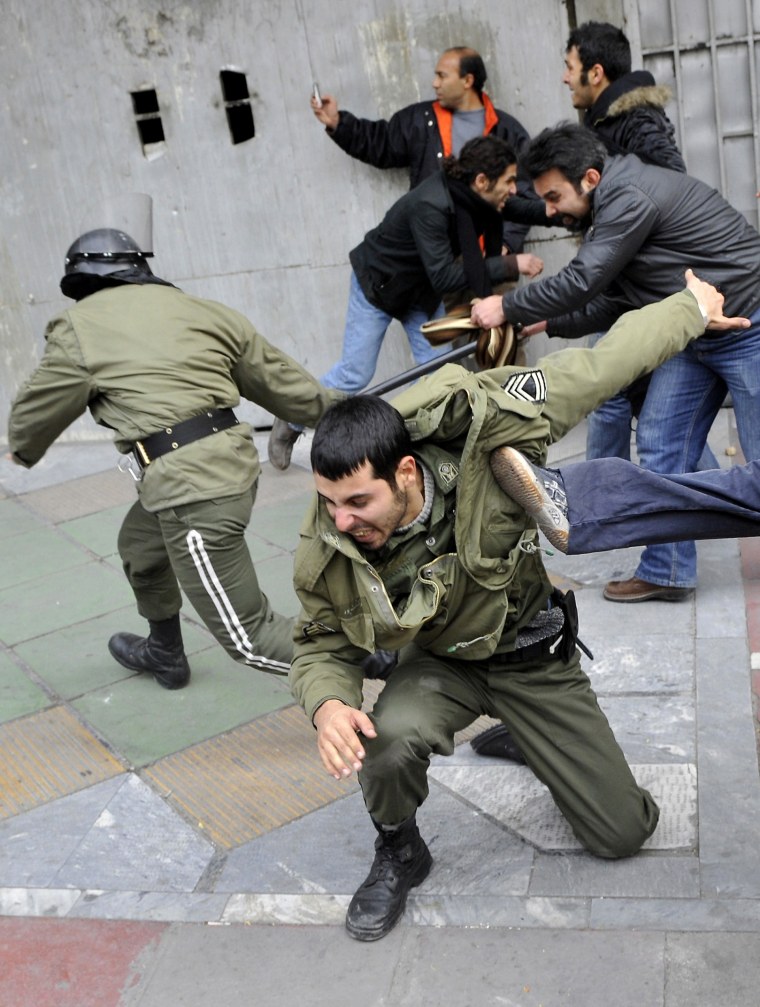Iranian security forces opened fire on anti-government protesters in the capital Sunday, killing at least five people in the fiercest clashes in months, opposition Web sites and witnesses said. Another four people were reported killed in the northern city of Tabriz.
Some accounts of the violence in Tehran were vivid and detailed, but they could not be independently confirmed because of government restrictions on media coverage. Police, who denied using firearms, said dozens of officers were injured and more than 300 protesters were arrested.
Thousands of opposition supporters chanting "Death to the dictator," a reference to hard-line President Mahmoud Ahmadinejad, defied official warnings of a harsh crackdown on any protests coinciding with a religious observance. Iranians were marking Ashoura, commemorating the seventh-century death in battle of one of Shiite Islam's most beloved saints.
Security forces tried but failed to disperse protesters on a central Tehran street with tear gas, charges by baton-wielding officers and warning shots fired into the air. They then opened fire directly at protesters, killing at least three people, said witnesses and the pro-reform Web site Rah-e-Sabz.
Witnesses said one of the victims was an elderly man who had a gunshot wound to the forehead. He was seen being carried away by opposition supporters with blood covering his face.
The clashes marked the bloodiest confrontation between protesters and security forces since the height of the unrest in the weeks after June's disputed presidential election. The opposition says Ahmadinejad won the June election through massive vote fraud and that its leader, Mir Hossein Mousavi, was the true winner.
An aide to Mousavi says a nephew of Mousavi was killed in the fighting between protesters and security forces. The close aide to Mousavi says the nephew, Ali Mousavi, died of wounds in a hospital on Sunday. The aide spoke on condition of anonymity because of fears of reprisals from the government. A reformist Web site, Parlemannews.ir, also says Mousavi's nephew was killed.
An Iranian opposition website said at least four protesters also were killed in the northwestern city of Tabriz on Sunday during clashes between opposition supporters and security forces.
"During clashes between security forces and protesters ... at least four protesters were killed in Tabriz and many others wounded," said the Jaras website.
Ambulance sirens
Reporters from foreign media organizations were barred from covering the demonstrations on Tehran's central Engelab Street, or Revolution Street, and the reports of deaths could not be independently confirmed. Ambulance sirens could be heard near the site of the protests.
The witnesses and opposition Web site said angry protesters threw stones at security forces and set dozens of their motorbikes on fire. Police helicopters circled overhead as clouds of black smoke billowed into the sky over the capital.
Police had blocked streets leading to the center of the capital to try to prevent thousands of people from joining the protest. Still, many opposition supporters managed to break the security wall.
Fierce clashes also broke out Sunday between security forces and opposition supporters in the cities of Isfahan and Najafabad in central Iran, the Rah-e-Sabz Web site said.
The Jaras Web site reported that some police officers refused orders to shoot at protesters.
"Police forces are refusing their commanders' orders to shoot at demonstrators in central Tehran ... some of them try to shoot into air when pressured by their commanders," Jaras said.
Cell phone services were down and Internet connections were slowed to a crawl, as has happened during most other days of opposition protest in an apparent government attempt to limit attention on the events.
Opposition activists have held a series of anti-government protests since the death of a dissident cleric last week.
The Dec. 20 death of the 87-year-old Grand Ayatollah Hossein Ali Montazeri, a sharp critic of Iran's leaders, has given a new push to opposition protests, which have endured despite a heavy security crackdown since the election.
Anti-government slogans
His memorials have brought out not only the young, urban activists who filled the ranks of earlier protests, but also older, more religious Iranians who revered Montazeri on grounds of faith as much as politics. Tens of thousands marched in his funeral procession in the holy city of Qom on Monday, many chanting slogans against the government.
Iran's police chief, Gen. Ismail Ahmadi Moghaddam, had threatened tougher action against protesters on Sunday should they hold rallies.
Opposition leaders have used holidays and other symbolic days in recent months to stage anti-government rallies.
About 50 plainclothes hard-liners disrupted a speech by former reformist President Mohammad Khatami Saturday evening, attacking and injuring several of those who attended the speech, according to the pro-reform Web site http://www.salaamnews.ir.
The attackers chanted slogans in support of Iran's Supreme Leader Ayatollah Ali Khamenei, it said.
Khatami was speaking at the former residence of the late Ayatollah Ruhollah Khomeini, the father of Iran's 1979 revolution, in north Tehran on the occasion of the Ashoura holiday.
